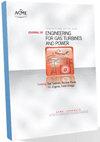A Study On Quantities Driving Maintenance, Repair, and Overhaul for Hybrid-Electric Aeroengines
IF 2.1
4区 工程技术
Q3 ENGINEERING, MECHANICAL
Journal of Engineering for Gas Turbines and Power-transactions of The Asme
Pub Date : 2023-11-02
DOI:10.1115/1.4063580
引用次数: 0
Abstract
Abstract Hybrid-electric propulsion for commercial aircraft is currently a key industry interest. Consequently, publications on its design and performance estimation are manifold. However, models addressing characteristics of maintenance, repair, and overhaul (MRO) are virtually unavailable—even though direct maintenance costs (DMC) represent a significant part of direct operating costs (DOC) in commercial aviation. Detailed analysis of hybrid-electric aircraft propulsion degradation and maintenance scenarios must integrate both methods of sizing and design as well as operational factors for conventional and electric subsystems, as operator-specific utilization strongly influences MRO. Accordingly, a holistic engine analysis model is currently being developed using the example of an Airbus A320 aircraft, taking into account flight mission, engine performance, degradation, and MRO. This paper presents an implementation of hybridization into the gas turbine thermodynamic cycle calculation for parallel hybrid-electric (PHE) engine architectures with 2 and 5 MW electric motors, and the approach necessary for resizing hybridized gas turbine components. Turbomachinery loading throughout representative short-haul missions is analyzed for conventional and hybrid-electric configurations based on the V2500 high-bypass turbofan engine, whereby unknown or uncertain boundary conditions are considered in a probabilistic sensitivity study. As a result, MRO-driving quantities such as engine performance parameters, atmospheric conditions, and ingested aerosols can be compared. The findings suggest that DMC related to the gas turbine may be considerably lowered through hybridization, as it allows for reduced peak temperatures and more uniform gas turbine operation. However, these gains are at least partially offset by additional components' DMC. For electrical machines, bearings and the stator winding insulation are life-limiting, where the latter becomes increasingly dominant for higher power densities associated with high current densities and copper losses. Thermo-mechanical stresses are considered as driving mechanisms in power electronic systems degradation. Consequently, powerful lightweight machines must be balanced against tolerable thermal and electrical loads to achieve suitable service life.混合动力航空发动机维护、维修与大修的数量驱动研究
商用飞机的混合动力推进技术是目前业界关注的热点。因此,关于其设计和性能评估的出版物是多种多样的。然而,处理维护、修理和大修(MRO)特征的模型实际上是不可用的——即使直接维护成本(DMC)代表了商业航空直接运营成本(DOC)的重要组成部分。对混合动力飞机推进退化和维护场景的详细分析必须结合尺寸和设计方法,以及常规和电气子系统的运行因素,因为运营商特定的利用率对MRO有很大影响。因此,目前正在以空客A320飞机为例,开发一个考虑飞行任务、发动机性能、退化和MRO的整体发动机分析模型。本文介绍了将混合动力技术应用于2 MW和5 MW并联混合动力发动机结构的燃气轮机热力循环计算,以及调整混合动力燃气轮机部件尺寸所需的方法。基于V2500大涵道比涡扇发动机,分析了常规和混合动力配置下典型短途任务的涡轮机械载荷,其中未知或不确定的边界条件在概率敏感性研究中被考虑。因此,可以比较发动机性能参数、大气条件和吸入的气溶胶等mri驱动量。研究结果表明,通过杂交,与燃气轮机相关的DMC可能会大大降低,因为它允许降低峰值温度和更均匀的燃气轮机运行。然而,这些增益至少部分地被额外组件的DMC抵消。对于电机,轴承和定子绕组绝缘是限制寿命的,后者在与高电流密度和铜损耗相关的高功率密度中越来越占主导地位。热机械应力被认为是电力电子系统退化的驱动机制。因此,强大的轻型机器必须与可容忍的热负荷和电负荷相平衡,以达到合适的使用寿命。
本文章由计算机程序翻译,如有差异,请以英文原文为准。
求助全文
约1分钟内获得全文
求助全文
来源期刊
CiteScore
3.80
自引率
20.00%
发文量
292
审稿时长
2.0 months
期刊介绍:
The ASME Journal of Engineering for Gas Turbines and Power publishes archival-quality papers in the areas of gas and steam turbine technology, nuclear engineering, internal combustion engines, and fossil power generation. It covers a broad spectrum of practical topics of interest to industry. Subject areas covered include: thermodynamics; fluid mechanics; heat transfer; and modeling; propulsion and power generation components and systems; combustion, fuels, and emissions; nuclear reactor systems and components; thermal hydraulics; heat exchangers; nuclear fuel technology and waste management; I. C. engines for marine, rail, and power generation; steam and hydro power generation; advanced cycles for fossil energy generation; pollution control and environmental effects.

 求助内容:
求助内容: 应助结果提醒方式:
应助结果提醒方式:


